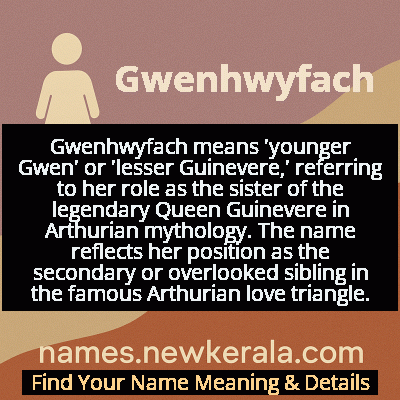Gwenhwyfach Name Meaning & Details
Origin, Popularity, Numerology Analysis & Name Meaning of Gwenhwyfach
Discover the origin, meaning, and cultural significance of the name GWENHWYFACH. Delve into its historical roots and explore the lasting impact it has had on communities and traditions.
Name
Gwenhwyfach
Gender
Female
Origin
Arthurian
Lucky Number
6
Meaning of the Name - Gwenhwyfach
Gwenhwyfach means 'younger Gwen' or 'lesser Guinevere,' referring to her role as the sister of the legendary Queen Guinevere in Arthurian mythology. The name reflects her position as the secondary or overlooked sibling in the famous Arthurian love triangle.
Gwenhwyfach - Complete Numerology Analysis
Your Numerology Number
Based on Pythagorean Numerology System
Ruling Planet
Venus
Positive Nature
Harmonious, responsible, caring, and artistic.
Negative Traits
Overly idealistic, superficial, possessive, or jealous.
Lucky Colours
Pink, turquoise.
Lucky Days
Friday.
Lucky Stones
Diamond, turquoise.
Harmony Numbers
2, 3, 9.
Best Suited Professions
Artists, musicians, teachers, healthcare workers.
What People Like About You
Warmth, nurturing nature, artistic flair.
Famous People Named Gwenhwyfach
Gwenhwyfach ferch Gogfran
Arthurian character
Sister to Queen Guinevere who appears in Welsh Triads as the instigator of the Battle of Camlann
Gwenhwyfach (literary character)
Mythological figure
Appears in various medieval texts as the sister whose conflict with Guinevere contributes to Camelot's downfall
Gwenhwyfach (modern interpretation)
Literary archetype
Revived in modern Arthurian retellings as a complex character representing sibling rivalry and political ambition
Name Variations & International Equivalents
Click on blue names to explore their detailed meanings. Gray names with will be available soon.
Cultural & Historical Significance
In broader cultural context, Gwenhwyfach embodies the archetype of the 'lesser sister' or shadow figure who exists in contrast to her more famous sibling. Her story has evolved through centuries of Arthurian retellings, from medieval Welsh texts to modern feminist interpretations. Contemporary authors often use her character to explore themes of female agency, political ambition, and the complex relationships between women in patriarchal societies. She serves as a reminder that history is often written from the perspective of winners and that supporting characters can have profound impacts on legendary narratives.
Extended Personality Analysis
Gwenhwyfach is typically characterized by a complex blend of ambition, resentment, and strategic intelligence. As the younger sister living in Guinevere's shadow, she often displays deep-seated jealousy and a burning desire for recognition. This manifests as political cunning, manipulative behavior, and sometimes outright treachery as she seeks to establish her own identity and power. Her personality reflects the psychological toll of constant comparison and the struggle for autonomy when defined primarily by relationship to a more famous sibling.
Modern interpretations have added nuance to this archetype, portraying Gwenhwyfach as more sympathetic - a woman of considerable intelligence and capability who is frustrated by her limited opportunities. She may be shown as politically astute, understanding court dynamics better than her sister, but lacking Guinevere's beauty or charm. This creates a character who is both dangerous and pitiable, capable of great loyalty but also profound betrayal. Her personality represents the dark side of family bonds and the corrosive effects of envy, while also speaking to universal themes of identity formation and the human need for recognition and respect.
Modern Usage & Popularity
In contemporary usage, Gwenhwyfach remains an exceptionally rare name, primarily confined to Arthurian enthusiasts, historical fiction authors, and parents deeply invested in Welsh mythology or unique literary names. The name has never gained mainstream popularity due to its complexity, unfamiliar pronunciation for non-Welsh speakers, and strong association with a relatively obscure mythological figure. However, it sees occasional use in fantasy literature circles, among historical reenactment communities, and as a character name in Arthurian-themed games and media. The recent trend toward reviving ancient and mythological names has generated some renewed interest, though it remains far less common than related names like Guinevere, Gwen, or even Morgana. Its usage is almost exclusively in English-speaking countries with strong Arthurian traditions, and it typically appeals to parents seeking names with deep mythological roots and distinctive character.
Symbolic & Spiritual Meanings
Symbolically, Gwenhwyfach represents the power of the overlooked and the destructive potential of envy. Her name literally suggests 'the lesser Gwen' or 'younger Guinevere,' making her a symbol of living in someone else's shadow and the psychological impact of constant comparison. She embodies how personal grievances, when left unaddressed, can escalate into catastrophic consequences, as her conflict with Guinevere ultimately contributes to Camelot's downfall. Metaphorically, she represents the idea that supporting characters and minor figures can wield enormous influence over historical events, serving as a reminder that history is shaped by complex networks of relationships rather than just heroic individuals. Her story also symbolizes the tension between sisters, the competition for limited power in patriarchal systems, and how family dynamics can become magnified into matters of state with far-reaching implications.

